SDG 17 in Saudi Arabia: Partnerships for the Goals
Sustainable Development Goal 17 (SDG 17) emphasizes the importance of strengthening global partnerships to support sustainable development and achieve the SDGs. This includes enhancing financial resources, improving technology, fostering trade, and building capacity, all through international cooperation and collaboration. Saudi Arabia recognizes the importance of partnerships, both domestically and globally, to achieve its Vision 2030 goals and contribute to global sustainable development efforts.
Saudi Arabia’s Approach to SDG 17
International Development Cooperation:
Saudi Arabia plays a key role in supporting international development through financial aid and humanitarian assistance. The Kingdom contributes significantly to international organizations such as the United Nations, the World Bank, and regional development funds. Through the Saudi Fund for Development (SFD), the government provides financial assistance and loans to developing countries, particularly in infrastructure, education, and healthcare.
Global and Regional Partnerships:
Saudi Arabia is a member of various global and regional organizations, such as the G20, where it fosters dialogue on economic cooperation and sustainability. The Kingdom has been an advocate for addressing global challenges, including climate change, energy sustainability, and economic inequality, aligning its Vision 2030 with international development goals.
Technology and Knowledge Transfer:
Saudi Arabia is working to enhance technology and knowledge sharing, especially in areas such as renewable energy, healthcare, and education. Collaborations with international organizations, universities, and private companies have facilitated the development of innovative solutions to challenges like climate change, water management, and urbanization.
Public-Private Partnerships (PPP):
The Saudi government encourages collaboration between the public and private sectors to promote economic growth and development. Public-Private Partnerships are a key feature of Vision 2030, fostering investment in infrastructure, renewable energy, and digital transformation projects. These partnerships leverage private sector innovation and investment to achieve national development goals.
Capacity Building and Institutional Strengthening:
Saudi Arabia is investing in capacity-building programs to enhance human resources and institutional frameworks. The government has implemented training programs, educational reforms, and digital transformation initiatives to improve governance, transparency, and efficiency in public institutions.
Trade and Economic Cooperation:
Saudi Arabia is working to strengthen trade relations with countries worldwide. Through the Saudi Exports Development Authority, the Kingdom promotes non-oil exports and diversifies its economy. The World Trade Organization (WTO) membership also enhances Saudi Arabia's ability to engage in global trade partnerships, promoting economic growth and sustainability.
Majmaah University and SDG 17
Majmaah University actively contributes to SDG 17 by fostering partnerships, promoting research, and engaging in collaborative projects with various institutions and organizations, both locally and internationally.
Research Collaborations:
Majmaah University engages in research collaborations with other universities, research centers, and international organizations. These partnerships promote the exchange of knowledge, expertise, and resources in areas such as environmental sustainability, healthcare, technology, and education. Collaborative research projects contribute to solving global challenges while advancing national development priorities.
Educational Partnerships:
The university has established partnerships with national and international educational institutions to enhance academic programs, promote student exchanges, and develop joint research initiatives. These collaborations provide opportunities for students and faculty to engage in global learning experiences and contribute to sustainable development solutions.
Public-Private Partnerships (PPP):
Majmaah University works with private companies and government bodies to foster innovation and support research in fields such as technology, environmental science, and healthcare. These partnerships help bridge the gap between academia and industry, ensuring that research outcomes are applied to real-world challenges and contribute to the national development agenda.
Community Engagement and Capacity Building:
The university plays a vital role in community engagement and capacity building through educational outreach programs and training workshops. These initiatives aim to strengthen local institutions, improve governance, and promote sustainable practices. Majmaah University also collaborates with local municipalities and governmental agencies to support regional development projects aligned with Vision 2030 and the SDGs.
Participation in National and International Networks:
Majmaah University is an active participant in national and international academic networks. These networks allow the university to collaborate with global institutions on research, education, and sustainability initiatives. By being part of these networks, the university contributes to knowledge-sharing platforms and the development of innovative solutions for global challenges.
Technology and Innovation Transfer:
The university fosters technology transfer through partnerships with research institutions and private enterprises. This involves sharing innovative solutions, research outputs, and technological advancements that can be applied to improve sustainability in various sectors. The focus on renewable energy, water management, and healthcare technologies directly supports national efforts in sustainable development.
SDG 17, focused on partnerships for achieving sustainable development, is a cornerstone of Saudi Arabia's Vision 2030 strategy. The government’s efforts to strengthen global and regional partnerships, promote trade, enhance technology transfer, and encourage public-private collaborations are essential to achieving both national and international development goals.
Majmaah University contributes to SDG 17 by fostering collaborations in research, education, and innovation, actively participating in public-private partnerships, and engaging in community capacity-building efforts. The university’s role in promoting partnerships supports both the Kingdom’s sustainability goals and broader global development initiatives.
Kingdom Vision 2030 Platform
https://www.mu.edu.sa/ar/departments/the-vision-realization-office/180486
System definition:
In line with the university’s policy of fully interacting with the Kingdom’s Vision 2030, and introducing it, its objectives, and the programs that serve it, His Excellency the University President, Dr. Khalid bin Saad Al-Muqrin, issued directives for the university to work on building an interactive system to spread the culture of the vision. Based on this directive, the Kingdom’s Vision 2030 Realization Office at the university, with the grateful support of the General Administration of Administrative and Financial Affairs, and in cooperation with the Project Management Office, the Deanship of Information Technology, the General Administration of Operation and Maintenance, and the General Administration of University Security, built this system and distributed interactive platforms in all university facilities. It is an interactive technical system that works to provide information, news, and media about the programs and initiatives of the Kingdom’s Vision 2030, whether carried out by the university or other entities in the Kingdom, and allows everyone to view this by browsing the electronic platforms distributed across the university’s departments, which number 26 platforms, which were taken into account to be in a prominent place in each of the university’s departments so that they are easy to access by university members and non-members.
System components:
The system consists of two parts:
Section One: A general section on all platforms, and it contains the following:
- Saudi Vision 2030 website.
- University Initiatives Department in the Kingdom's Vision 2030.
- Vision video gallery.
- Vision photo gallery.
- Gallery of articles on vision.
- News gallery for the latest developments in the vision.
Section Two: Specific to the entity where the platform is installed, allowing it to highlight its activity in the field of achieving the Kingdom’s Vision 2030, and it contains the following:
- Gallery of videos produced by the organization .
- Photo gallery of the entity .
- Gallery of articles about the region
- Region news gallery .
- This section also allows the entity to add any activities and advertisements it desires, even outside the field of view.
Vision Realization Office Objectives
- Supporting the National Transformation Plan to achieve Vision 2030.
- Working to employ the university’s equipment to develop the components of society.
- Contributing to the university’s role in supporting the national development plan.
- Working to make knowledge available to all seekers easily and conveniently.
- Reaching the largest possible number of learners with the least effort, time and cost.
- Contribute to determining the university’s priorities in accordance with the requirements of the National Transformation Program.
Office tasks
- Proposing development initiatives that contribute to achieving the Kingdom’s Vision 2030 inside and outside the university within its geographical scope.
- Working on implementing the development initiatives related to the vision, in integration with the university’s departments, and in accordance with its strategic vision.
- Monitoring the activities and programs of the Kingdom’s Vision 2030 implemented by the university in order to subject them to continuous evaluation according to specific standards with the aim of developing them.
- Documenting successful experiences and best practices in the field of the Kingdom’s Vision 2030 in order to benefit from them.
- Developing financial, administrative and regulatory guidelines to facilitate their use in the activities of the Kingdom’s Vision 2030.
- Building and activating technical systems that help the office manage the Kingdom’s Vision 2030 file, in cooperation with the relevant authorities at the university.
- Any other tasks assigned to the Observatory within its field of expertise.
Management of the Kingdom's Vision 2030 programs
This department is concerned with implementing and following up on the university’s programs related to the Kingdom’s Vision 2030. This department includes two units:
- Vision Initiatives Unit.
- Vision alignment unit.
Approved and implemented initiatives
- The first initiative: Digital Development Initiative:
Initiative description:
The initiative aims to empower and qualify citizens’ human capital to possess technical skills related to the following fields of knowledge: networks and the Internet, information security, technical applications, electronic crimes, electronic transactions, social communication, and technical innovations. This is done through non-traditional methods based on practical training and applied technical simulation.
To view the initiative, click here.
- The second initiative: Open Courses Initiative:
Initiative Description:
The university aims through this to adopt the concept of education linked to open source courses, which has emerged in the past few years worldwide as an effective tool for spreading science and knowledge to all segments of society who wish to develop themselves in all areas of interest, in support of formal education and the shift towards lifelong learning.
To view the initiative, click here.
https://www.mu.edu.sa/ar/news/centers-and-institutes/cifal-center/204016
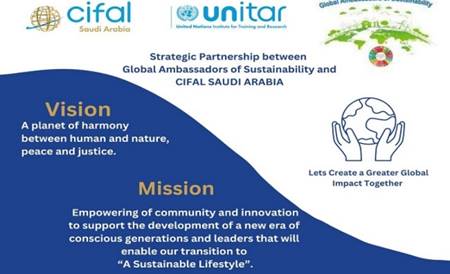
Launching the Sustainability Ambassadors Platform in the Kingdom of Saudi Arabia under the auspices of the Ceval Center
The Ceval Center in the Kingdom of Saudi Arabia announced the launch of its first strategic initiative to create a global platform for sustainability ambassadors. This platform is supervised by the center, and this initiative aims to bring together those interested in sustainability issues from around the world.
Dr. Ayman bin Jameel Al-Barakati, Director of the Sival Center, expressed his happiness at launching this platform, which comes as part of the center’s ongoing efforts to support sustainable development. He extended his sincere thanks to all participants and contributors to the establishment of this platform, most notably the Chairman of the Board of Directors of the Sival Center, Prof. Saleh bin Abdullah Al-Mazal.
The platform aims to be a global platform that includes many initiatives and activities related to sustainability, and aims to enhance cooperation and interaction between participants in the field of sustainability.
This initiative reflects the Kingdom of Saudi Arabia’s commitment to promoting sustainable development and the transition to a more environmentally, economically, and socially sustainable future. We hope that the platform will be effective in supporting sustainable development efforts and achieving positive change at the global level.
https://www.mu.edu.sa/ar/news/general/216181
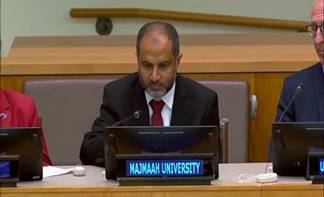
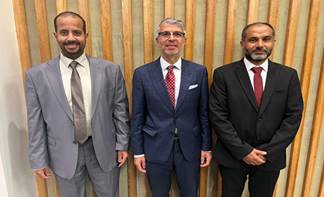
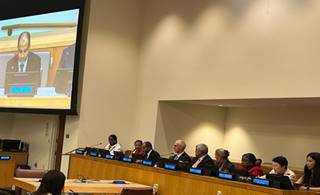
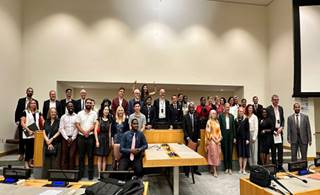
Majmaah University participates in the Higher Education for Sustainability Forum within the High-Level Political ForumMajmaah University participates in the Higher Education for Sustainability Forum within the High-Level Political Forum
Under the follow-up and guidance of His Excellency the President of the University - Chairman of the Board of Directors of the Saudi Ceval Center, Prof. Saleh bin Abdullah Al-Muzal - the University participated in the Higher Education for Sustainability Forum (HESI) for the year 2024, which was held as a special event within the High-Level Political Forum (HLPF) to follow up and review the 2030 Agenda for Sustainable Development.
The event was attended by His Excellency the Permanent Representative of the Kingdom to the United Nations, Ambassador Dr. Abdulaziz Al-Wasil, and high-level representatives from international organizations and governments. The university was represented as a speaker by the Vice-Rector for Graduate Studies and Scientific Research, Professor Dr. Muhammad bin Abdulrahman Al-Shahri.
The event focused on “The Future of Higher Education for Sustainable Development,” and the forum included multi-stakeholder discussions on the intersection of education, innovation, and sustainability, with a focus on the impact of AI and other emerging technologies amid challenges related to stalled progress towards achieving the Sustainable Development Goals (SDGs).
The event highlighted inspiring initiatives from the UN system, HESI working groups and others, and the forum served as a preparatory platform for future initiatives to be promoted or launched at the Future Summit 2024, where recommendations and strategies from the forum will shape policies and practices, influencing action plans for sustainable development in higher education.
During the forum, the importance of transforming higher education institutions to keep pace with dynamic global changes and an unpredictable future was recognized, while valuing local knowledge and partnerships, exploiting global opportunities for innovation, and promoting sustainable and equitable development around the world. Areas were identified in which higher education institutions can enhance the achievement of the Sustainable Development Goals through inclusive emerging technologies, including artificial intelligence, while managing related social changes. The membership network was also expanded through the active participation of diverse HESI working groups.
For his part, Professor Dr. Muhammad bin Abdulrahman Al-Shahri stressed the support and guidance of His Excellency the University President - and Chairman of the Board of Directors of the Saudi Ceval Center - in enhancing the role of the university in such global events, which enhances the university’s position and contributes to achieving sustainable development goals at the local and international levels.
https://www.mu.edu.sa/ar/news/general/216176
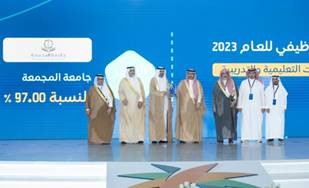
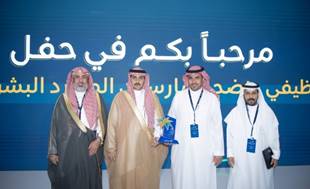
The university received the Excellence and Leadership Award in the educational institutions category, as it achieved first place in the periodic measurement project for job engagement for the year 2023 AD, which is one of the projects of the Kingdom’s Vision 2030 AD related to the third level of the vision’s goals (improving the productivity of government sector employees), and the Ministry of Human Resources and Social Development honored the university on the occasion of this achievement according to the results of the project and the criterion of sustainable job engagement.
The Director General of Human Resources Department, Mr. Suleiman bin Badr Al-Badr, explained that the university’s achievement of first place comes as a result of joint work and cooperation between the various departments in the university, and in light of the interest and follow-up by the university president, Professor Dr. Saleh bin Abdullah Al-Muzal. He stressed that the university is keen to invest in human competencies and harness their role in achieving the project of periodic measurement of job engagement, and achieving the university’s third strategic plan, extending his thanks to all university employees for their efforts and achieving this accomplishment.
General Administration of Relations and Conferences
https://www.mu.edu.sa/ar/administrations/public-relations-and-conferences

Vision
The General Administration of Public Relations and Conferences seeks to build a good reputation and create a positive mental image of the university among all segments of society, individuals and institutions, through a number of plans, programs and activities, and to gain their credibility and trust, and to strive to reach the highest levels of belonging to the university among all its members and to bear the responsibility of organizing all occasions and events.
Message
Building a bridge of internal and external communication and contact, introducing the university, its colleges, activities, and various achievements to all segments and categories of society, enhancing the work environment that encourages creativity, excellence, and idealism, creating a family atmosphere, spreading the spirit of affection and brotherhood among employees within the university, and contributing to organizing events with the highest levels of quality through a qualified, caring team capable of organizing and dealing with the means and technologies of communication and information that are renewed.
Values
- Balanced affiliation to the university - Moral commitment.
- Teamwork - Giving and sacrifice.
- Justice, equality and integrity - Good treatment of beneficiaries.
- Transparency and credibility - Spirit of initiative and renewal.
- Excellence, innovation and creativity - Development of team members.
- Interaction with variables.
Saudi CIVIL Center Highlights Commitment to Sustainability and Strengthens International Partnerships at Qatar CSR Conference 2024
https://www.mu.edu.sa/ar/news/centers-and-institutes/cifal-center/214566
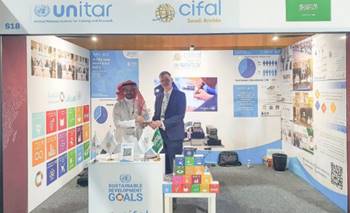
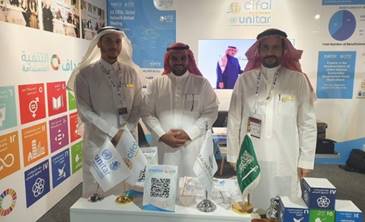
In confirmation of its firm commitment to supporting sustainability and achieving the United Nations Sustainable Development Goals, Ceval Center participated actively in the second edition of the Qatar Social Responsibility Conference and Exhibition, held from April 30 to May 2, 2024 at the Qatar National Convention Center.
This conference is part of the National Social Responsibility Program and represents an international platform that brings together specialists, industry leaders and academics to promote sustainable development and highlight Saudi Arabia’s ongoing efforts in this field.
Commenting on the participation, Dr. Ayman bin Jameel Al-Barakati, Director of the Ceval Center, praised the continuous support that the center receives from His Excellency the President of the University, Professor Saleh bin Abdullah Al-Mazal, and the Vice President for Development and Investment, Professor Muslim bin Mohammed Al-Dosari, stressing that the great support that we receive at the center from the university leadership reflects the deep interest in building capacities and enhancing skills in the field of social responsibility and sustainability and achieving the global goals and the 2030 Agenda, which enables the center to participate effectively in international forums such as this conference.
During the conference, the Ceval Center showcased its diverse initiatives and capabilities that aim to integrate economic, social and environmental goals into the work of institutions, reflecting the center’s commitment to sustainable development goals. The conference witnessed a large attendance and showed remarkable interest in the Ceval Center’s pavilion.
On the sidelines of the conference, constructive meetings were held with Dr. Saif bin Ali Al-Hajri, CEO of the Qatar National Social Responsibility Program, and Dr. Bader Al-Ismail, Chairman of the Social Responsibility Committee at Qatar University. During these meetings, ways of cooperation to enhance social responsibility and sustainability practices were discussed.
In addition, meetings were held with representatives of the International Labour Organization, UNESCO Partnerships Departments, and a number of companies and other international organizations to discuss opportunities for cooperation and partnership.
It is worth noting that these meetings are an important step towards expanding the network of international partnerships of the Ceval Center and enhancing its role as a major player in the field of social responsibility and sustainability worldwide.
The International Conference shall be held: Universities and the Sustainable Development Goals 2030
https://event.mu.edu.sa/universities-conference
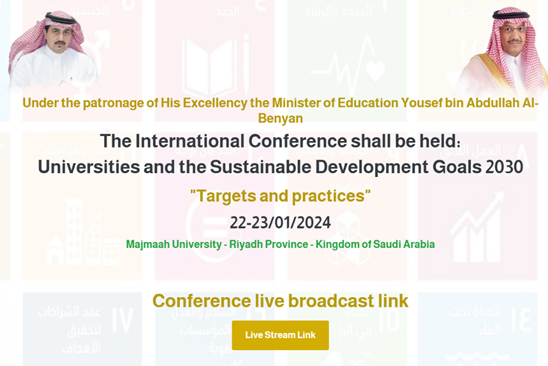
This conference represents a global call to unite the efforts and intellectual and academic minds and those interested in the Global Agenda for Sustainable Development 2030, who share a clear vision and a directed commitment aimed at promoting sustainable development worldwide, as the conference seeks to emphasize the importance of the responsibility entrusted to universities in achieving the Sustainable Development Goals 2030 (SDGs), in line with the successive development towards knowledge, understanding and practical application of these goals. This prominent event is a fertile forum for reflection and exchange of experiences, and contributes to expanding the horizon of knowledge, deepening understanding, and encouraging innovation and development in the fields of sustainability, as we aspire through it to launch the spirit of cooperation and dialogue between scientists, thinkers and innovators in order to achieve tangible and sustainable progress in this vital field, and we look forward - during its period - to a dialogue environment that contributes to creating an opportunity to review and discuss achievements, challenges and future opportunities related to the role of universities in achieving the sustainable development goals 2030.
Conference Venue:
Majmaah University is one of the public universities in the Kingdom of Saudi Arabia in the Riyadh region, and the university serves a geographical scope that includes the northern governorates of the Riyadh region. The university provides education at the undergraduate, postgraduate and applied studies levels, where more than 20,000 students study in the disciplines of medicine, allied medicine, dentistry, engineering, science, artificial intelligence, cybersecurity, law and business administration, arts and education, and universities also receive international students from different countries of the world, and there are specialized research centers and laboratories in health, engineering, science, and humanities, and there is a center specialized in rehabilitation techniques for the manufacture and installation of prostheses.
Main objectives of the conference
The core objectives of this conference are to enable in-depth dialogue on sustainable development and achieve its goals, and we seek to highlight the vital role played by universities in this context, with a focus on building strategic partnerships to promote sustainability initiatives and practices, and the conference also works to integrate the diversity of visions and solutions, to ensure a deeper and multidimensional understanding of sustainable development issues, by creating an environment to emphasize the role of universities in accelerating work to achieve the Sustainable Development Goals 2030. Through this intellectual, scientific and professional forum, we hope to contribute to the exchange of knowledge, promote innovative thinking, and build the optimal capabilities of universities and individuals to achieve the goals of sustainability 2030, and summarize the main objectives of the conference as follows:
- Seek to shed light on the key and multifaceted role of universities in achieving the Sustainable Development Goals, while reviewing their achievements and the challenges they have faced.
- Provide a platform for the exchange and discussion of innovative strategies and approaches to enhance the effectiveness of universities in achieving these goals.
- Create an appropriate environment that stimulates substantive discussions, mutual learning and enhance cooperation among participants.
- Focus on strengthening the capabilities and determination of universities and individuals in pursuit of sustainability.
- Emphasizing joint efforts and renewed cooperation that can contribute to achieving tangible progress in the field of sustainable development, ensuring a more just and sustainable future for all.
Conference Themes
The international conference "Universities and the Sustainable Development Goals 2030: Targets and Practices" revolves around four carefully selected themes, each designed to stimulate insightful discussions and meaningful contributions.
The first axis: development and sustainability: goals, concepts, and impacts.
It discusses the philosophy of development, sustainability and sustainable development, and concepts associated with the United Nations Sustainable Development Goals and aims to deepen our understanding of these critical concepts in a global context.
Second Theme: Sustainable Development Goals 2030 and the Kingdom's Vision 2030
It presents topics that discuss the relationship between the Kingdom's Vision 2030 and the Sustainable Development Goals 2030 by mentioning aspects of the link between the development goals and the vision, as well as the Kingdom's efforts in achieving the sustainable development goals.
Third Theme: The Role of Universities in Achieving the Sustainable Development Goals 2030: Current Reality
It describes the reality of the efforts made by universities through their functions to contribute to the achievement of the Sustainable Development Goals 2030, and the obstacles that universities face in order to play the role required of them in this field.
Fourth Theme: Activating the role of universities in accelerating the achievement of the Sustainable Development Goals 2030
This theme allows participants to present proposed strategies and visions to activate the role of universities in achieving and accelerating the achievement of sustainable development goals.
Participation of the medical team in the Higher Education Conference in Riyadh
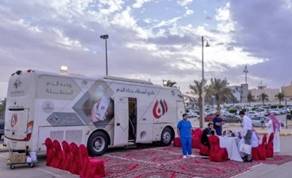
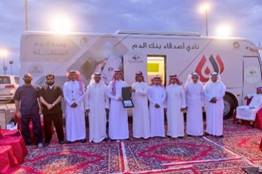
The medical team of the university's medical services participated in Majmaah University's participation in the Higher Education Conference
Which was held in Riyadh during the period 5/8/1440 to 8/8/1440
https://www.mu.edu.sa/ar/news/general/216181
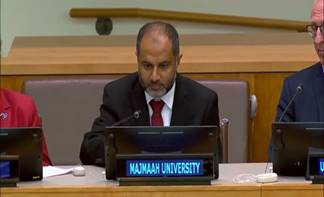
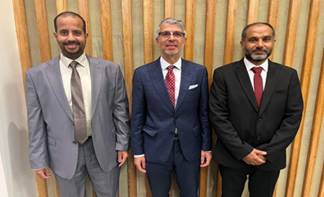
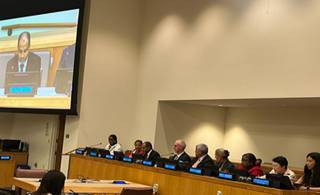
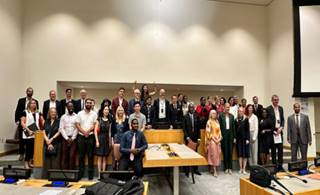
Majmaah University participates in the Higher Education for Sustainability Forum within the High-Level Political ForumMajmaah University participates in the Higher Education for Sustainability Forum within the High-Level Political Forum
Under the follow-up and guidance of His Excellency the President of the University - Chairman of the Board of Directors of the Saudi Ceval Center, Prof. Saleh bin Abdullah Al-Muzal - the University participated in the Higher Education for Sustainability Forum (HESI) for the year 2024, which was held as a special event within the High-Level Political Forum (HLPF) to follow up and review the 2030 Agenda for Sustainable Development.
The event was attended by His Excellency the Permanent Representative of the Kingdom to the United Nations, Ambassador Dr. Abdulaziz Al-Wasil, and high-level representatives from international organizations and governments. The university was represented as a speaker by the Vice-Rector for Graduate Studies and Scientific Research, Professor Dr. Muhammad bin Abdulrahman Al-Shahri.
The event focused on “The Future of Higher Education for Sustainable Development,” and the forum included multi-stakeholder discussions on the intersection of education, innovation, and sustainability, with a focus on the impact of AI and other emerging technologies amid challenges related to stalled progress towards achieving the Sustainable Development Goals (SDGs).
The event highlighted inspiring initiatives from the UN system, HESI working groups and others, and the forum served as a preparatory platform for future initiatives to be promoted or launched at the Future Summit 2024, where recommendations and strategies from the forum will shape policies and practices, influencing action plans for sustainable development in higher education.
During the forum, the importance of transforming higher education institutions to keep pace with dynamic global changes and an unpredictable future was recognized, while valuing local knowledge and partnerships, exploiting global opportunities for innovation, and promoting sustainable and equitable development around the world. Areas were identified in which higher education institutions can enhance the achievement of the Sustainable Development Goals through inclusive emerging technologies, including artificial intelligence, while managing related social changes. The membership network was also expanded through the active participation of diverse HESI working groups.
For his part, Professor Dr. Muhammad bin Abdulrahman Al-Shahri stressed the support and guidance of His Excellency the University President - and Chairman of the Board of Directors of the Saudi Ceval Center - in enhancing the role of the university in such global events, which enhances the university’s position and contributes to achieving sustainable development goals at the local and international levels.




